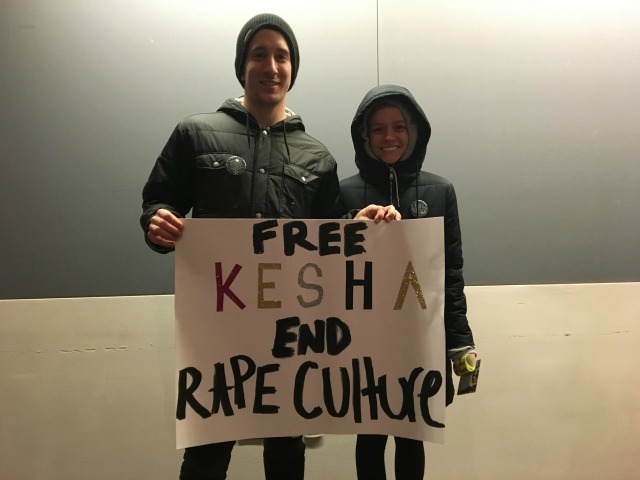Loyola Students Rally For #FreeKesha And Against Rape Culture In Music Industry
By Chicagoist_Guest in Arts & Entertainment on Feb 27, 2016 9:05PM

A couple of Loyola students hold a handmade sign for the Free Kesha rally. By Meagan Fredette/Chicagoist
By Meagan Fredette
Kesha's concert at the North Side's Loyola University was cancelled, but a handful of students still braved the cold Friday night to rally in support of the #FreeKesha movement.
Kesha, of course, is the celebrated glittery singer whose hits like “Party At a Rich Dude’s House” have made her pop music’s Andrew WK. The star, born Kesha Rose Sebert, is currently mired in a protracted legal battle to be released from her contract with her producer Lukasz Gottwald, a.k.a Dr Luke. She alleges that Gottwald abused her, both emotionally and sexually, and caused her to develop an eating disorder for which she sought treatment at a local rehab facility in 2014.
Organizer and Loyola student Melissa Haggerty had originally intended for the rally to coincide with Kesha’s performance at the university. That the “Tik Tok” singer cancelled her appearance, citing “personal reasons”, did not deter around 35 students from attending the rally. And while the cold kept most of the students bundled up, some wore glitter or homemade “Free Kesha” shirts and buttons.
Organizers led chants of “My body, my choice” and Speakers from FURIE and the Men’s Project (via Loyola’s Student Diversity and Multicultural Affairs department) led a discussion that allowed other participants to share their own stories of assault. The speakers touched on several aspects of rape culture: namely, that Kesha’s case highlights a very distinct reason why sexual assault victims do not come forward. Because even when they do, they are scrutinized by their community, their employers, their schools, and law enforcement, the very institutions designed to protect a person’s well-being.
Student Jackson Santy, of the Men’s Project, notes that men have a part to play.
“We have a responsibility to dismantle the power and privilege that oppresses women and nonbinary people,” he says. “Redefining masculinity must be part the a solution.” Indeed, another male student addressed the rally, stating his palpable anguish that his daughter faces an increased risk of sexual assault when she goes to college. It is estimated that 23 percent of women will become victims of unwanted sexual contact on a collegiate campus.
Haley Potiker compiled an extensively-researched chronological timeline of Kesha’s lawsuit for Passion Weiss. In it, she notes that Kesha is simply just trying to leave her contract. The singer has not brought criminal charges against Dr. Luke for alleged abuse and sexual assault, and is not even suing him for damages in civil court. She just wants to make music without being tied to her alleged abuser. And after the preliminary injunction was denied in court last week, Kesha’s career remains in stasis.
Haggerty’s list of demands for the rally include that Kesha be released from her contract with at once. She feels that Sony’s defense of being able to work with another producer is “misleading” and she wondered, “why can’t Sony just fire Dr. Luke?”. It seems like a sensical fix - after all, the humanity of victim should trump the millions of dollars Gottwald earns for his labels, but unfortunately we don’t live in that world.
Sexual harassment and assault in the music industry is unfortunately nothing new. Like Kesha, who began working with Dr. Luke as a teenager (after he convinced her to turn down a scholarship to Barnard to pursue music), many women have found themselves victimized by men in the industry who wield enormous power. Last year, Jackie Fox of the Runaways publicly stated that she was raped by their manager Kim Fowley 1975. And just a couple days ago, Dirty Projectors collaborator Lark Grimm accused Michael Gira of Swans of rape and sexual harassment, and dropping her from his label Young God Records after she confronted him.
There are so many more stories like this that will go untold. Women in music worry about their safety from all aspects of the industry: from producers to executives to bandmates to publicists to, in my own personal case, other journalists. For too long, it was seen as a danger inherent in the work, but women are finally beginning to speak out. In 2015, then-MTV Editorial Director Jessica Hopper solicited tweets from folks within the industry to recount a time in which they “didn’t count”—the resulting replies sparked a worldwide conversation about sexism within music. And in secret, women convene on Facebook or in hushed tones at shows to warn each other about who to avoid. Kesha’s case is a terrible example of what happens when victims speak out—but hopefully her bravery can be a catalyst for change within music.